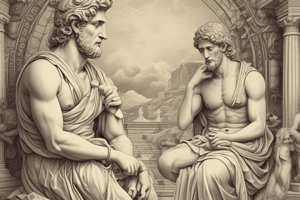Podcast
Questions and Answers
Who is considered the founder of political philosophy?
Who is considered the founder of political philosophy?
- Pythagoras
- Aristotle
- Plato
- Socrates (correct)
Which philosopher taught that everything flows and that there is a unity of opposites expressed through dialectic?
Which philosopher taught that everything flows and that there is a unity of opposites expressed through dialectic?
- Xenophanes
- Empedocles
- Parmenides
- Heraclitus (correct)
Which school of thought posited multiple elements set in motion by love and strife or by Mind and denied that sense phenomena revealed the world as it actually was?
Which school of thought posited multiple elements set in motion by love and strife or by Mind and denied that sense phenomena revealed the world as it actually was?
- Cynicism
- Sophism
- Milesian school
- Pluralism (correct)
Which philosopher sought to reconcile religious belief and reason, incorporating ascetic ideals and emphasizing the correspondence between mathematics and the cosmos in a musical harmony?
Which philosopher sought to reconcile religious belief and reason, incorporating ascetic ideals and emphasizing the correspondence between mathematics and the cosmos in a musical harmony?
Which philosopher argued that the first principle of being was One, indivisible, and unchanging, and that Being, by definition, implies eternality, while only that which is can be thought?
Which philosopher argued that the first principle of being was One, indivisible, and unchanging, and that Being, by definition, implies eternality, while only that which is can be thought?
Who was a philosopher that opposed the utopian style of theorizing and relied on the understood and observed behaviors of people in reality to formulate his theories?
Who was a philosopher that opposed the utopian style of theorizing and relied on the understood and observed behaviors of people in reality to formulate his theories?
Which school of thought was founded by Antisthenes, who was a disciple of Socrates, and Diogenes, his contemporary?
Which school of thought was founded by Antisthenes, who was a disciple of Socrates, and Diogenes, his contemporary?
Which philosophy suspends judgment regarding all non-evident propositions to bring the mind to a state of equanimity?
Which philosophy suspends judgment regarding all non-evident propositions to bring the mind to a state of equanimity?
Which period absorbed ideas from the Peripatetic and Stoic schools?
Which period absorbed ideas from the Peripatetic and Stoic schools?
Flashcards
Ancient Greek Philosophy
Ancient Greek Philosophy
Ancient Greek philosophy, starting in the 6th century BC, covered diverse subjects like astronomy, mathematics, ethics, and aesthetics, profoundly shaping Western culture through the ages.
Pre-Socratic Philosophy
Pre-Socratic Philosophy
Pre-Socratic philosophy focused on cosmology, ontology, and mathematics, seeking to understand the universe's fundamental nature before Socrates' focus on ethics.
Milesian School
Milesian School
The Milesian school sought a fundamental natural substance that remained constant despite changing forms, pioneering early scientific inquiry akin to modern atomic theory.
Heraclitus' Philosophy
Heraclitus' Philosophy
Signup and view all the flashcards
Protagoras' Sophism
Protagoras' Sophism
Signup and view all the flashcards
Socrates' Philosophy
Socrates' Philosophy
Signup and view all the flashcards
Cynicism
Cynicism
Signup and view all the flashcards
Pyrrhonism
Pyrrhonism
Signup and view all the flashcards
Middle Platonism
Middle Platonism
Signup and view all the flashcards
Study Notes
Philosophical Origins and Foundation of Western Civilization:
-
Ancient Greek philosophy emerged in the 6th century BC and encompassed a wide range of subjects, including astronomy, mathematics, ethics, and aesthetics.
-
Greek philosophy influenced Western culture throughout history, with lines of influence leading from ancient Greek and Hellenistic philosophers to Roman philosophy, Early Islamic philosophy, Medieval Scholasticism, the European Renaissance, and the Age of Enlightenment.
-
Greek philosophy was influenced by older Near Eastern wisdom literature and mythological cosmogonies, although the extent of this influence is debated.
-
Pre-Socratic philosophy, which preceded the Athenian school of Socrates, Plato, and Aristotle, was primarily concerned with cosmology, ontology, and mathematics.
-
The Milesian school, including Thales, Anaximander, and Anaximenes, sought a natural substance that remained unchanged despite appearing in different forms, leading to early scientific attempts to answer the question that would lead to modern atomic theory.
-
Xenophanes ridiculed the anthropomorphism of Greek religion and argued that each phenomenon had a natural, rather than divine, explanation.
-
Pythagoras sought to reconcile religious belief and reason, incorporating ascetic ideals and emphasizing the correspondence between mathematics and the cosmos in a musical harmony.
-
Heraclitus taught that everything flows, and that there is a unity of opposites expressed through dialectic.
-
Parmenides argued that the first principle of being was One, indivisible, and unchanging, and that Being, by definition, implies eternality, while only that which is can be thought.
-
Pluralism, including the theories of Empedocles and Anaxagoras, posited multiple elements set in motion by love and strife or by Mind and denied that sense phenomena revealed the world as it actually was.
-
Sophism arose from the juxtaposition of physis and nomos, and Protagoras is credited with teaching radical perspectivism, where some things seem to be one way for one person and another way for another person, leading to the conclusion that one cannot look to nature for guidance regarding how to live.
-
Socrates, born in Athens in the 5th century BC, is considered the founder of political philosophy and brought philosophy down from the heavens to examine life and morals, and good and evil. He pursued a probing question-and-answer style of examination and taught that all virtue is knowledge, frequently remarking on his own ignorance.Ancient Greek Philosophy
-
Socrates was a philosopher who acknowledged that he knew nothing noble and good, while others did not know that they did not know.
-
Pericles was a friend of Anaxagoras, a philosopher, but his political opponents used conservative reactions to strike at him and the philosophers.
-
Numerous philosophical movements were inspired by Socrates or his younger associates and either directly or indirectly influenced by him.
-
Plato was an Athenian philosopher who was a primary source of information about Socrates' life and beliefs.
-
Plato's dialogues feature Socrates, although not always as the leader of the conversation.
-
Aristotle was a philosopher who opposed the utopian style of theorizing and relied on the understood and observed behaviors of people in reality to formulate his theories.
-
Cynicism was founded by Antisthenes, who was a disciple of Socrates, and Diogenes, his contemporary.
-
The Cyrenaics were hedonists who held that pleasure was the supreme good in life, especially physical pleasure.
-
The Megarian school's ethical teachings were derived from Socrates, recognizing a single good, which was apparently combined with the Eleatic doctrine of Unity.
-
Pyrrhonism is a philosophy that suspends judgment regarding all non-evident propositions to bring the mind to ataraxia (a state of equanimity).
-
Epicurus studied in Athens with Nausiphanes, who was a follower of Democritus and a student of Pyrrho of Elis.
-
Stoicism's metaphysics were based in materialism, which was structured by logos, reason, and their logical contributions still feature in contemporary propositional calculus.The Development of Greek Philosophy: From the Presocratics to the Neoplatonists
-
The Academic skeptics doubted humans' capacity to obtain truth, based on Plato's Phaedo.
-
The Pyrrhonists aimed to attain ataraxia, while the Academic skeptics criticized the dogmas of other philosophical schools, particularly the Stoics.
-
The Middle Platonism period absorbed ideas from the Peripatetic and Stoic schools.
-
Neoplatonists, beginning with Plotinus, believed that mind exists before matter and that the universe has a singular cause, becoming essentially a religion and influencing Gnosticism and Christian theology.
-
Greek ideas were largely forgotten in Western Europe during the Middle Ages due to the decline in literacy, but were preserved and studied in the Byzantine Empire.
-
Islamic philosophers such as Al-Kindi, Al-Farabi, Ibn Sina, and Ibn Rushd reinterpreted these works and had a great influence on Medieval philosophers such as Thomas Aquinas.
-
The re-introduction of Greek philosophy in the High Middle Ages was through translations from Arabic to Latin and original Greek manuscripts from the Byzantine Empire.
Studying That Suits You
Use AI to generate personalized quizzes and flashcards to suit your learning preferences.




